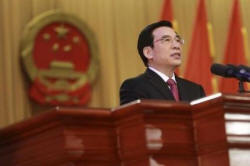|
 Beijing
mayor promises frugal, smog-free Winter Games Beijing
mayor promises frugal, smog-free Winter Games
 Send a link to a friend
Send a link to a friend
[March 24, 2015]
BEIJING (Reuters) - If Beijing wins
the right to hold the 2022 Winter Olympics they will be both frugal and
free from the city's notorious smog, the city's mayor was quoted as
saying in a state-run newspaper on Tuesday.
|
|
 "Holding the Games in a frugal way is not a slogan, it's a reality,"
Mayor Wang Anshun said, according to the official China Daily. "We
will make full use of our current sports facilities and strictly
control construction costs." "Holding the Games in a frugal way is not a slogan, it's a reality,"
Mayor Wang Anshun said, according to the official China Daily. "We
will make full use of our current sports facilities and strictly
control construction costs."
Beijing, along with the nearby city of Zhangjiakou jointly bidding
for the Games, is playing host this week to an evaluation team from
the International Olympic Committee.
Beijing, which hosted the 2008 summer Olympics to broad acclaim, is
planning to make use of existing facilities to lessen the costs.
Wang said that new facilities would be a boost for the economy, and
be used after the Games are over.

With South Korea's Pyeongchang hosting the 2018 Winter Games and
Tokyo the 2020 Summer Games, the odds of Asia getting a third
successive Olympics had initially seemed remote.
But only Beijing and Kazakhstan's Almaty have been left in the 2022
race though neither city is a winter sports powerhouse.
Despite strong political backing and a proven track record, Beijing
faces serious doubts over its poor air.
While Beijing made strenuous efforts to clean up its air in time for
the 2008 summer Olympics, the city still suffers from terrible smog,
so bad on occasion that it forces the airport to shut and envelops
everything with a thick, choking haze.
"We are prepared to reduce the use of coal, alleviate pollution
caused by traffic, extend the use of new energy vehicles and ask
more polluting plants to move out of Beijing," Wang said.
[to top of second column] |

"We promise the air quality will meet World Health Organisation
standards by the start of the winter of 2022."
Average levels of hazardous airborne particles known as PM2.5 stood
at 85.9 micrograms per cubic meters in 2014, down four percent
compared with the previous year, but still far higher than the
national air quality standard of 35 micrograms.
Beijing plans to bring readings down to 60 by 2017, the municipal
environmental bureau said earlier this year.
(Reporting by Ben Blanchard; editing by Sudipto Ganguly)
[© 2015 Thomson Reuters. All rights
reserved.]
Copyright 2015 Reuters. All rights reserved. This material may not be published,
broadcast, rewritten or redistributed.

 |